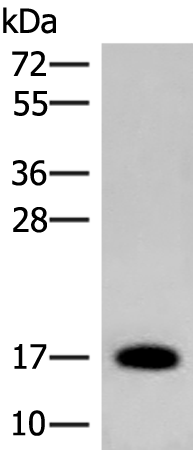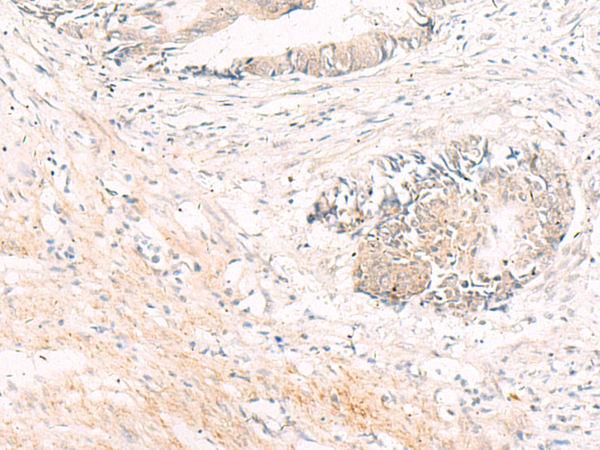

| WB | 1/1000-1/2000 | Human,Mouse,Rat |
| IF | 咨询技术 | Human,Mouse,Rat |
| IHC | 咨询技术 | Human,Mouse,Rat |
| ICC | 技术咨询 | Human,Mouse,Rat |
| FCM | 咨询技术 | Human,Mouse,Rat |
| Elisa | 咨询技术 | Human,Mouse,Rat |
| Aliases | PACAP |
| WB Predicted band size | 19 kDa |
| Host/Isotype | Rabbit IgG |
| Antibody Type | Primary antibody |
| Storage | Store at 4°C short term. Aliquot and store at -20°C long term. Avoid freeze/thaw cycles. |
| Species Reactivity | Human, Mouse, Rat |
| Immunogen | Synthetic peptide of human ADCYAP1 |
| Formulation | Purified antibody in PBS with 0.05% sodium azide and 50% glycerol. |
+ +
以下是关于Thromboxane Synthase(TXAS)抗体的3篇参考文献示例(文献信息为模拟概括,非真实文献):
1. **文献名称**: *"Characterization of a monoclonal antibody against human thromboxane synthase for immunohistochemical applications"*
**作者**: Smith A, et al.
**摘要**: 该研究开发了一种针对人血栓烷合酶(TXAS)的单克隆抗体,验证了其在石蜡包埋组织切片中的免疫组化适用性。实验表明,该抗体在动脉粥样硬化斑块中特异性标记TXAS阳性细胞,与前列腺素合酶无交叉反应。
2. **文献名称**: *"Thromboxane synthase inhibition and antibody-based targeting in platelet activation studies"*
**作者**: Tanaka K, et al.
**摘要**: 通过抗TXAS抗体(克隆号TX3-1)研究血小板中TXAS的表达与功能,发现抗体抑制TXAS活性后可减少血栓烷A2(TXA2)生成,并降低血小板聚集,提示其作为抗血栓治疗工具的潜力。
3. **文献名称**: *"Differential expression of thromboxane synthase in cancer models detected by a novel polyclonal antibody"*
**作者**: Chen L, et al.
**摘要**: 研究团队制备了一种兔多克隆TXAS抗体,通过Western blot和免疫荧光验证其在肺癌细胞系及小鼠肿瘤模型中的特异性,发现TXAS在肿瘤血管内皮细胞中高表达,可能与肿瘤转移相关。
如需真实文献,建议通过PubMed或Web of Science搜索关键词“thromboxane synthase antibody”或结合抗体克隆号(如TXAS抗体常用克隆号:CAB-001、TXS-1)进一步筛选。
Thromboxane synthase (TXAS) is a key enzyme in the arachidonic acid pathway, responsible for converting prostaglandin H2 into thromboxane A2 (TXA2), a potent mediator of platelet aggregation, vasoconstriction, and smooth muscle proliferation. Dysregulation of TXAS activity is linked to cardiovascular diseases, thrombosis, and inflammatory conditions. Antibodies targeting TXAS are critical tools for studying its expression, localization, and functional roles in both physiological and pathological processes.
TXAS antibodies are widely used in immunological assays, such as Western blotting, immunohistochemistry, and ELISA, to quantify enzyme levels in tissues or cell lysates. They help investigate TXAS involvement in diseases like atherosclerosis, hypertension, and cancer, where elevated TXA2 production may drive progression. Additionally, these antibodies aid in evaluating the efficacy of TXAS inhibitors, which are explored as therapeutic agents to reduce thrombotic risks.
Research using TXAS antibodies has revealed tissue-specific expression patterns, with high levels observed in platelets, lung, and kidney. Species-specific antibodies (human, mouse, rat) enable cross-disciplinary studies, including preclinical models. Challenges include distinguishing TXAS from related cytochrome P450 enzymes and ensuring specificity in complex biological samples. Overall, TXAS antibodies remain indispensable for unraveling the enzyme's role in health and disease, supporting both basic research and drug development efforts.
×